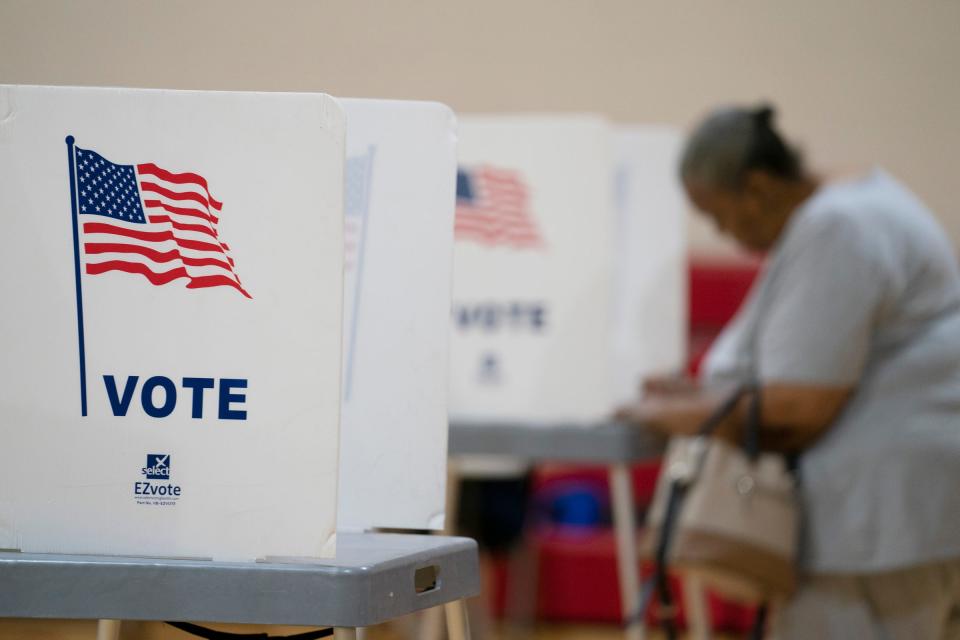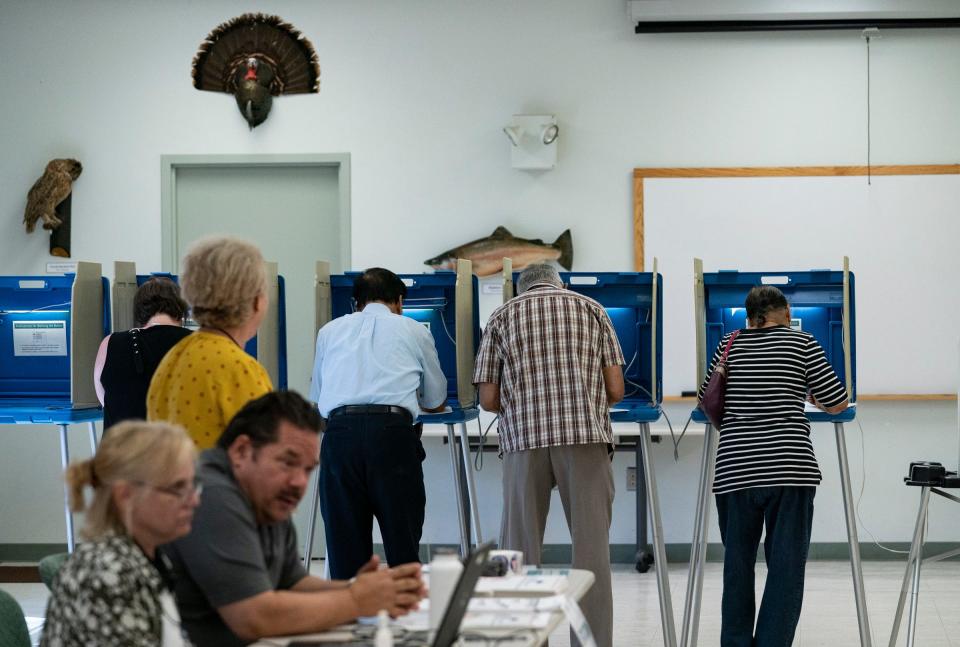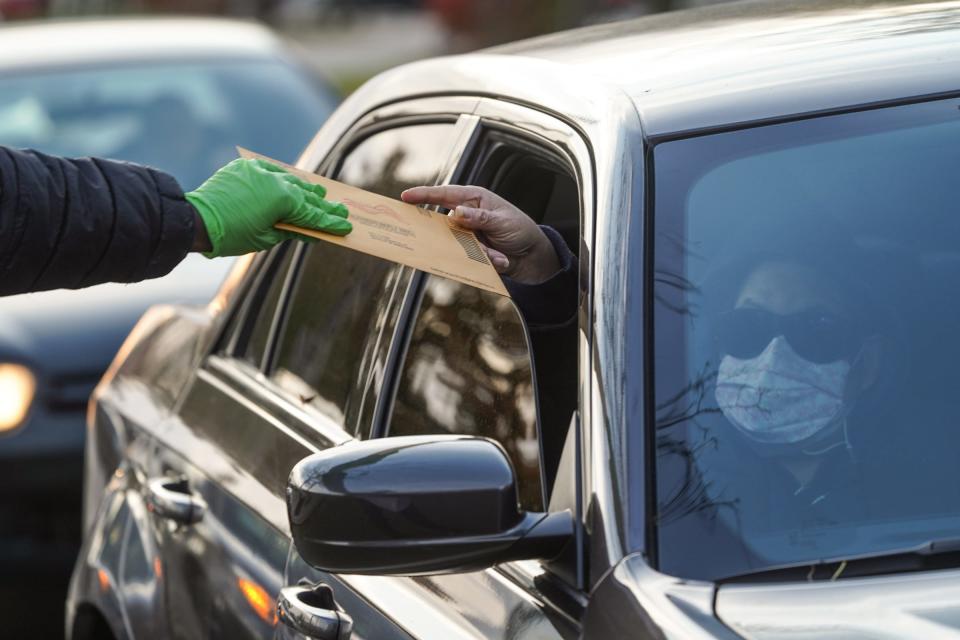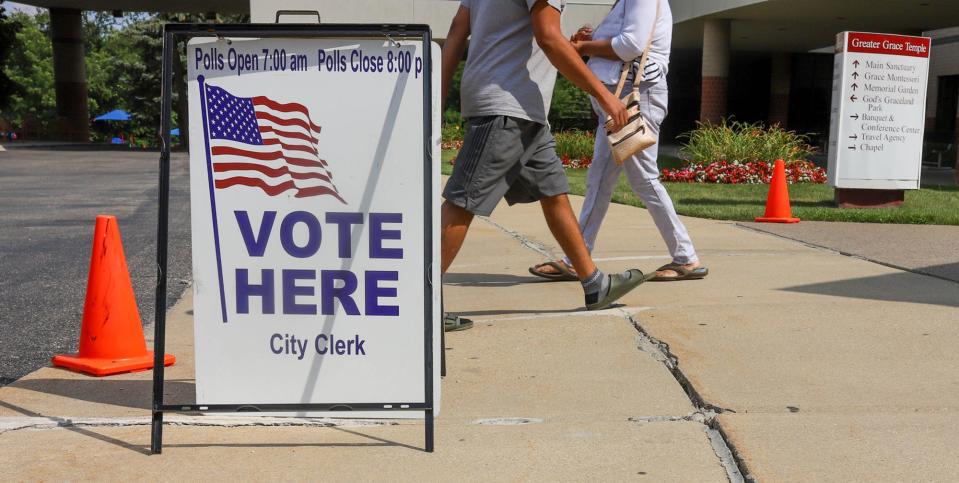Proposal 2 in Michigan: A guide to the wide-ranging amendment focused on elections
- Oops!Something went wrong.Please try again later.
During the last midterm election, Michigan voters adopted a constitutional amendment to expand voting rights in the state. Now, they have a chance to make additional changes to Michigan's elections this fall, adopting or rejecting a wide-ranging proposal that would amend the state's constitution to establish early voting, enshrine current photo ID rules and much more.
Nearly 67% of voters in the 2018 election adopted the Promote the Vote amendment, enacting a trio of key changes: allowing every voter in the state to cast an absentee ballot for any reason, enabling eligible individuals to register to vote on Election Day and giving voters the option to select a straight party option on the ballot to vote for all the candidates from one political party.
The constitutional amendment from Promote the Vote on the ballot this year − Proposal 2 − seeks to expand on those rights with a slew of changes and preempt efforts to enact stricter voter ID laws and interfere with the certification of future elections.
Khalilah Spencer, board president for Promote the Vote, said the amendment mirrors election procedures in place in other states.
"These are all things that are proven to be secure and they're also things that are proven to increase or make things more accessible. You don't have to sort of trade off security for accessibility. You can have elections that are secure and accessible," she said.

Secure MI Vote, a GOP-backed initiative proposing legislation in direct contradiction with many of changes put forward in Proposal 2, has launched a campaign asking voters to vote against the constitutional amendment from Promote the Vote.
If voters adopt the proposal, it would essentially eliminate the possibility that lawmakers could pass the stringent voter ID requirements and ban on private donations to election offices proposed by Secure MI Vote and billed as a way to bolster election security and integrity.
"It's irrelevant," Secure MI Vote spokesperson Jamie Roe said. "Constitution trumps law."
Here's a guide to the changes put forward in Proposal 2.
More:Michigan's Proposal 1 would change term limits, require financial disclosure for lawmakers
More:Michigan's abortion amendment: Here's what it will and won't do if approved
Establish early voting in Michigan
Proposal 2 would establish early voting in Michigan at voting sites where voters would cast their ballots just as they would at their polling location on Election Day, placing their ballot into the tabulator themselves. Early voting sites would be open for at least nine days prior to Election Day for at least eight hours every day during statewide and federal elections.
Proponents say that early voting provides another convenient way for voters to participate in elections in addition to the 40 days of absentee voting allowed now.
Roe says that while he supports early voting, state lawmakers should have a chance to debate and discuss what the process should look like in Michigan.
"We are going to have a certain process enshrined in our constitution that's not easy to change," he said. "So if a better way comes along, it's very difficult to change."

Right to vote free from harassment
Proposal 2 would establish a "fundamental right to vote" in the Michigan Constitution and bar actions that have "the intent or effect of denying, abridging, interfering with, or unreasonably burdening the fundamental right to vote."
Spencer said that "given where we are politically, the fact that voters should have the right to vote free of harassment and intimidation" is a key focus of Promote the Vote in seeking support for its proposal.
More:GOP-backed Secure MI Vote turns in more than half a million signatures
More:Michigan elections panel places abortion, voting rights proposals on ballot
Codify current photo ID, absentee ballot verification rules
The constitutional amendment would codify Michigan's current photo ID rules for those voting in person and signature verification for those casting an absentee ballot.
Republican state lawmakers in 1996 approved Michigan's ID rules against Democratic opposition. The law wasn't in effect until a 2007 Michigan Supreme Court ruling allowing its enforcement. Today, Michigan voters must show a photo ID at the polls or sign an affidavit under penalty of perjury confirming their identity if they don't have an ID or didn't bring it with them.
The vast majority of those voting in person present a photo ID before casting a ballot.
Roe and other opponents call the affidavit option for those who don't possess an ID or didn't bring one to the polls a "loophole" to the ID requirement and have fought to eliminate it. They claim that the proposal would allow voters to never show an ID, but Spencer said that's misleading.
Election workers do not issue ballots to those who have a photo ID but refuse to show it or those who don't possess a photo ID or didn't bring it with them to the polls but refuse to sign the affidavit, according to Michigan's election officials' manual. That would continue to be the case if voters adopt Proposal 2, Spencer said.
Proposal 2 would also enshrine in the state constitution the current process to verify the identity of those returning absentee ballot applications and ballots through a signature match.

Allow voters to receive absentee ballots for all future elections through single request
Under current law, voters wishing to cast an absentee ballot must submit an application to receive a ballot before each election. Proposal 2 would allow voters to submit a single request to receive an absentee ballot for all future elections.
Under the proposal, voters who asked to automatically receive absentee ballots ahead of elections could later opt out. Election officials could also stop sending them if the voter does not vote for six straight years or they receive information suggesting the voter has moved.
Spencer suggested that change could help boost voter turnout, especially in local elections. "I think when people get a ballot, they're more likely to understand, 'oh, there's an election and it's time to vote,'" she said.
Clarify procedures for election audits
Proposal 2 would spell out in the state constitution that only election officials can conduct election audits and they must do so in public with publicly disclosed funds.
Spencer said the provision was inspired, in part, by calls for audits in the wake of the 2020 election other than those carried out by election officials.
More:Whitmer vetoes election bills aimed at overhauling voter ID rules
More:Michigan clerks concerned Secure MI Vote petition could have far-reaching impact
Require drop boxes, prepaid postage for absentee voting and ballot tracking system
Proposal 2 would require state-funded prepaid postage for voters returning absentee ballot applications and absentee ballots. It would also require state funding for a system for voters to track their absentee ballot requests and ballots.
Under the proposal, each municipality must provide voters access to at least one state-funded drop box accessible 24/7 during the 40 days before an election and until 8 p.m. on Election Day. Municipalities home to more than 15,000 voters must allocate one drop box for every 15,000 voters.

Clarify authority of local and state boards responsible for certifying election results
Proposal 2 would add unequivocal language in the Michigan Constitution stating, "The outcome of every election in this state shall be determined solely by the vote of electors casting ballots in the election."
It would also add language regarding the role of canvassing boards in certifying election results, stating that county canvassers can only certify elections based on the statements of returns from precincts and counting boards and that state canvassers can only certify elections based on the statements of votes from counties. Proposal 2 would also spell out in the state constitution that the Board of State Canvassers is the only entity that can certify elections for statewide and federal office.
In 2020, the Republican members of the Wayne County Board of Canvassers initially refused to sign off on the election results in the county before ultimately reversing course and a Republican member of the Board of State Canvassers abstained from certifying the election.
Former Michigan elections director Chris Thomas said during a news briefing that Proposal 2 clarifies the ministerial duties of canvassing boards and overrides a state law that seems to indicate that challenges to elections should go before the state Legislature instead of being handled in a recount or court.
"So I think it puts up guardrails that I think are there now, but this will make it extremely clear that they are there," he said. Thomas said it also insulates the certification of elections from legislative interference by increasing the barriers for state lawmakers seeking to change the process. "It creates the most permanent safeguards possible," Thomas said.
Allow election officials to accept donations
Under Proposal 2, counties, cities or townships could accept publicly-disclosed charitable donations and in-kind contributions to conduct elections.
Roe said that Proposal 2 would allow liberal billionaire philanthropists and political organizations to fund election administration. "What they're going to do is throw a door wide open, that's going to allow special interests of all sorts to march right through it," he said of those backing the amendment.
Democratic Gov. Gretchen Whitmer has vetoed GOP legislation seeking to bar donations to election offices after Michigan clerks received support from the Center for Tech and Civic Life, which received millions of dollars from Meta CEO Mark Zuckerberg and his wife, Priscilla Chan.
More than 450 Michigan municipalities received grants from the Center for Tech and Civic Life, according to tax filings. Both Democratic and Republican clerks have said that the money they received helped their offices pay election workers and purchase equipment.
Military and overseas ballots postmarked on Election Day would count even if election officials receive them after Election Day
Finally, Proposal 2 would require clerks to accept absentee ballots cast by military and overseas voters that have a postmark on or before Election Day if election officials receive those ballots within six days of an election.
Clara Hendrickson fact-checks Michigan issues and politics as a corps member with Report for America, an initiative of The GroundTruth Project. Make a tax-deductible contribution to support her work at bit.ly/freepRFA. Contact her at chendrickson@freepress.com or 313-296-5743. Follow her on Twitter @clarajanehen.
This article originally appeared on Detroit Free Press: Michigan's Proposal 2: How it would alter Michigan elections

